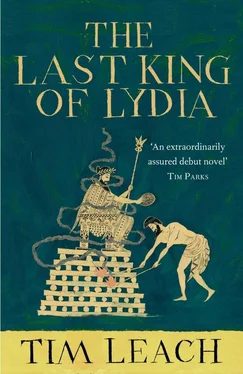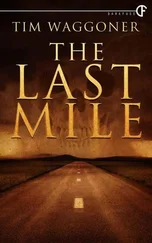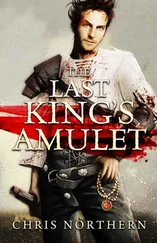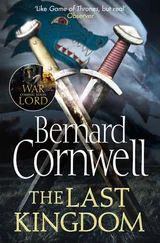Tim Leach - The Last King of Lydia
Здесь есть возможность читать онлайн «Tim Leach - The Last King of Lydia» весь текст электронной книги совершенно бесплатно (целиком полную версию без сокращений). В некоторых случаях можно слушать аудио, скачать через торрент в формате fb2 и присутствует краткое содержание. Год выпуска: 2013, ISBN: 2013, Издательство: Atlantic Books Ltd, Жанр: Исторические приключения, на английском языке. Описание произведения, (предисловие) а так же отзывы посетителей доступны на портале библиотеки ЛибКат.
- Название:The Last King of Lydia
- Автор:
- Издательство:Atlantic Books Ltd
- Жанр:
- Год:2013
- ISBN:9780857899200
- Рейтинг книги:5 / 5. Голосов: 1
-
Избранное:Добавить в избранное
- Отзывы:
-
Ваша оценка:
- 100
- 1
- 2
- 3
- 4
- 5
The Last King of Lydia: краткое содержание, описание и аннотация
Предлагаем к чтению аннотацию, описание, краткое содержание или предисловие (зависит от того, что написал сам автор книги «The Last King of Lydia»). Если вы не нашли необходимую информацию о книге — напишите в комментариях, мы постараемся отыскать её.
The Last King of Lydia — читать онлайн бесплатно полную книгу (весь текст) целиком
Ниже представлен текст книги, разбитый по страницам. Система сохранения места последней прочитанной страницы, позволяет с удобством читать онлайн бесплатно книгу «The Last King of Lydia», без необходимости каждый раз заново искать на чём Вы остановились. Поставьте закладку, и сможете в любой момент перейти на страницу, на которой закончили чтение.
Интервал:
Закладка:
‘Self-pity doesn’t become anyone, least of all you, Croesus.’ Isocrates placed both hands on the other man’s shoulders. ‘He will have to catch you first. Stay alive until the wars end. That is all you have to do.’
Croesus turned to Maia, but before he could speak, she embraced him and kissed him on the forehead. ‘Take care,’ she said. ‘We will see you again in a few years.’
He opened his mouth to reply, but found nothing to say. A heavy hand closed over his shoulder. He turned and saw a soldier behind him. The Persian was barely awake, rubbing sleep from his eyes with his free hand and resting his spear in the crook of his neck.
‘Come on,’ he said. ‘We are late.’
As they passed through the encampment, they came within a hundred paces of the tents of the sick and the mad. Some way distant he saw Gyges wandering aimlessly; a guard followed him closely, escorting him. Croesus raised his hand, in greeting and in farewell. Gyges looked up and saw him, but did not respond. There was a moment when their eyes met, and then his son returned to the tent of the madmen.
It could be that he did not care that his father was going to his death, but Croesus tried to believe that there was another reason for his son’s indifference. He wanted to think that Gyges knew something that he did not. That Croesus would live, and that they would see each other again.
Half of the Persian army broke away, with Harpagus at its head. They rode west, back towards the country where, once already, Croesus had cheated death.
5
The army drew up on the hills overlooking the coast, above the paired harbours of Phocaea.
It was the first of the cities that Harpagus intended to conquer, the most northerly of that cluster of Ionian settlements. Their inhabitants’ ancestors had fled wars in Attica and the Peloponnese, and had travelled to make new homes by the sea, wanting no more than to live in peace.
There must have been some reason, Croesus thought, why he had brought war to this place when he was a king, had sought to tame this poor and divided people. He could not think of it, and did not know what it was that now drew Cyrus and Harpagus to the place, to put the Ionians to the sword once again, other than some kind of historic inevitability, the way that kings always seem drawn to repeat what has been done before.
Croesus saw the people of Phocaea gathered on the walls, staring up at the Persian army. They must have lived their lives in fear of the sea, he thought, in fear of a towering wave, sent by some angry god, that would drag their city beneath the water. Now here was a wave that came from the land, a sea of spears and men and horses that would sweep over them and drown them all.
He looked across at Harpagus. ‘Fine walls,’ was the general’s only observation, delivered with grudging respect. He dispatched his emissary to deliver the terms of surrender. They stood silently on the hill, and waited for the Phocaeans to say no.
‘Well?’ Harpagus, when his man returned.
‘They ask for a day to consider our terms.’
Harpagus grunted in surprise. ‘What do you think, Croesus?’ There was a taunting edge to his voice. ‘I don’t see any reason to wait. We can take the city in a day.’
‘Do you care what I think?’
‘Let us pretend that I do.’
Croesus looked out at the harbour, and remembered what little he knew of the Phocaeans.
‘Wait,’ he said. ‘Where is the harm in that? It is only a single day. The army can rest. And the Phocaeans might change their minds.’
‘They won’t,’ Harpagus said. He shrugged. ‘But as you wish.’
Long before dawn, Croesus made his way through the sleeping army, and returned to the hill that overlooked the city and the sea. There was no moon, and he could see almost nothing of the settlement below. There were just a few points of light, where a torch had been lit or a fire still burned, as though the night sky had laid a part of itself over the city like a veil, covering it with darkness and a scattering of stars.
Croesus sat and wrapped his arms around his knees. He shivered, and waited for the dawn.
When the wind blew towards him, Croesus could hear the sounds of the city. Ropes drawing taut, water lapping against hollow wood, the creak of carts through the streets, arguments between families in an unfamiliar language, orders given in hard whispers.
The sun finally rose behind him, and it broke over a vision from a myth. A city on the water.
The sea was filled by a fleet of fifty oared ships. They rode low in the water, weighed down by huge sacks of grain and jars of water wrapped in fishing nets and lashed to the sides, their decks packed to overflowing with women and children. The entire city of Phocaea, its people and its treasures, were safe inside the wooden hulls and launched onto the ocean. The oars struck the water and drove the ships to the west, in search of a new world where war could not touch them.
Croesus thought of what might lie in those ships. Parchments that would be ruined by salt water, deciphered and copied and guessed at until they said something quite different. Heirlooms and treasures with stories that would be half-forgotten and misremembered, until their owners had invented a new past for themselves, better than the one they had left behind. Perhaps they had even taken with them a few chipped fragments of the statues that were too heavy for the boats, fragments that would inspire the next generation of Phocaean sculptors to recreate their lost artworks. A civilization that would be reborn when the ships again touched land.
Croesus sat and watched the fleet for a long time. Long enough for the ships to blur into each other on the horizon, as if they had been transformed into earth and stone and turned into a new island by the Gods.
When he finally looked away from the sea, he found Harpagus standing beside him.
‘You knew they would sail away, didn’t you?’ said Harpagus eventually.
‘Yes.’
Harpagus nodded. ‘As did I. Don’t think that you tricked me.’
‘You let them go? Why?’
‘Cyrus wants the port,’ he said, looking out over the sea. ‘I don’t believe he cares much what happens to the people.’
‘And you?’
‘I don’t care either.’ He looked back at Croesus. ‘The Phocaeans are my gift to you, Croesus.’ He gestured towards the fleet, the new city on the sea. ‘Remember this sight. There will not be much mercy after this.’
After that, the wars in the north passed like a nightmare remembered in fragments. Scattered sensations and scenes of chaos that were vivid to him when remembered individually, but made no sense when he tried to piece them together.
Nations he had himself conquered, years before, were enslaved once more. Cities that had been lain beneath the bull and lion were marked now with Cyrus’s gold eagle. Teos, Myrus, Priene, Colophon, Erythrae, and all the others. A thousand dead for each city taken.
As a king, he had seen nothing of the places he had defeated. The arrival of a messenger, an unrolled scroll, a single inked line, was all he had seen of conquest. Now, as a slave, he saw everything. Burned cities where the bodies of the dead melted and fused with the buildings, creating monsters of flesh and masonry. Temples stripped of their treasures and used as burial chambers, the flies teeming above the altars. The tiny armies that lined up before the Persian forces, armies which had no chance of victory, cobblers and bakers with rusty armour and the shields and spears of their fathers. They fought and died, and were forgotten, heaped together by slaves into huge piles that burned for days when the torches were put to them, sending towering pillars of smoke up into the sky. Offerings to the Gods, a warning to the men who watched from neighbouring cities, waiting for the Persians to come for them.
Читать дальшеИнтервал:
Закладка:
Похожие книги на «The Last King of Lydia»
Представляем Вашему вниманию похожие книги на «The Last King of Lydia» списком для выбора. Мы отобрали схожую по названию и смыслу литературу в надежде предоставить читателям больше вариантов отыскать новые, интересные, ещё непрочитанные произведения.
Обсуждение, отзывы о книге «The Last King of Lydia» и просто собственные мнения читателей. Оставьте ваши комментарии, напишите, что Вы думаете о произведении, его смысле или главных героях. Укажите что конкретно понравилось, а что нет, и почему Вы так считаете.












